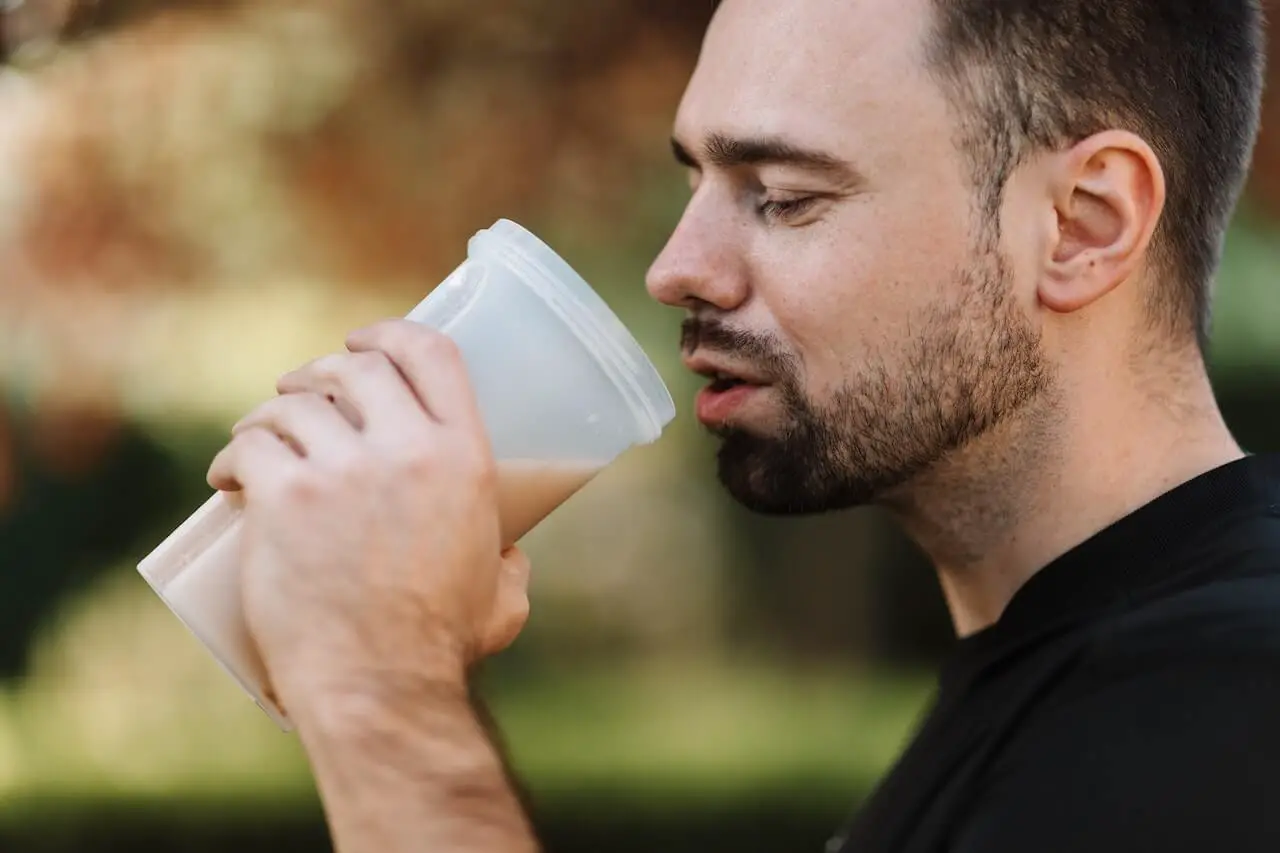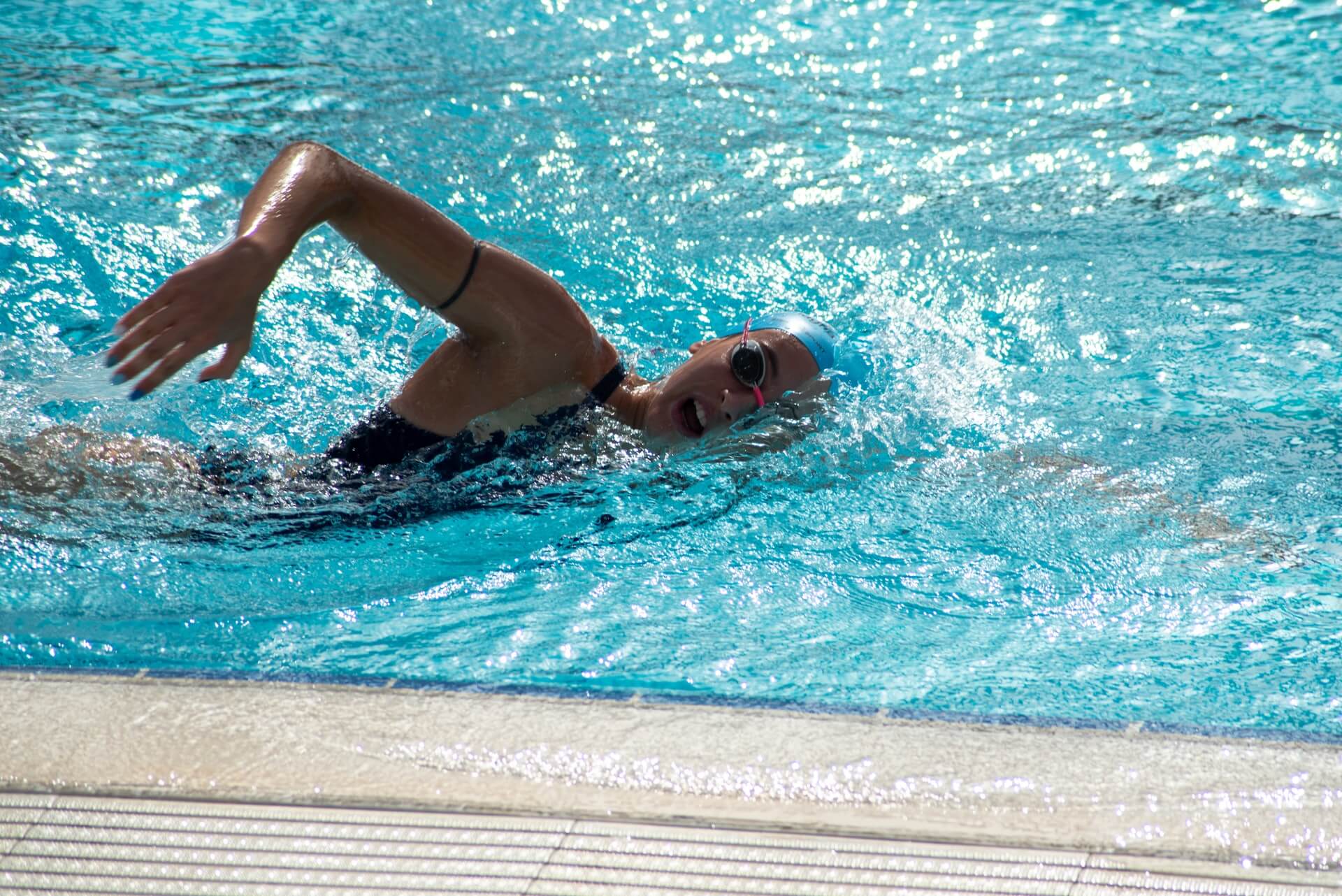As you train your muscles through swimming, you must provide them with the necessary nutrients to recover and grow. One way to achieve this is by incorporating protein shakes into your routine. However, should you drink a protein shake before or after swimming?

Research suggests it doesn’t matter much whether you drink a protein shake before or after swimming, or both. What truly matters is your total daily protein intake. Protein shakes can be a convenient way to deliver the necessary amino acids for muscle repair, maintaining muscle mass, and boosting your immune system.
In this article, we’ll dive into the benefits of protein shakes, how they can aid in your swimming recovery, how to make the most of them in your routine, and some considerations about when you should drink them.
Benefits of Protein Shakes for Swimmers
Muscle Recovery
After a vigorous swimming workout, your muscles can be left feeling tired and sore. Having a protein shake within 30-45 minutes after your session helps to provide essential amino acids to your muscles, allowing them to repair and maintain muscle mass.
This quick delivery of nutrients can not only reduce soreness but also promote faster recovery, so you’ll be ready to hit the pool again in no time.
Energy and Performance

When it comes to swimming, maintaining your energy levels is crucial for optimal performance. Incorporating protein shakes in your routine can ensure that you have enough energy to push through even the most challenging workouts.
Combining the shake with a carbohydrate source, such as instant oats, can further fuel your body, so you can continue to excel in the pool.
Weight Management
If you’re looking to manage your body weight while staying active, protein shakes can be a helpful addition to your diet.
They tend to keep you feeling full for longer, which may help reduce overall calorie intake throughout the day. This, in turn, can assist you in achieving your weight management goals without sacrificing the nutrients essential for swimmers like you.
Hydration and Nutrient Intake
Swimming is a demanding sport, and staying hydrated is vital for your overall well-being. Luckily, protein shakes can help with this too.
Mixing your protein powder with water or a sports drink can contribute to your daily fluid intake necessities. Additionally, protein shakes contain essential nutrients like vitamins and minerals to further support your athletic performance and overall health.
Determining Protein Needs for Swimming
Factors Affecting Protein Intake
As a swimmer, know that your protein needs are affected by various factors. These include your age, body weight, training intensity, and overall health.
For instance, if you’re training harder or trying to build muscle mass, you need to increase your protein intake to support muscle growth and repair.
Another factor to consider is the timing of your protein intake. Some swimmers prefer taking protein before their training sessions for energy, while others might opt for post-workout protein shakes to replenish and recover.
Recommended Daily Protein Intake
When it comes to determining your recommended daily protein intake as a swimmer, the general guideline is to consume between 1.2 to 2 grams of protein per kilogram of body weight.
For instance, if you weigh 70 kg, you should aim for 84 to 140 grams of protein per day. However, due to the strength and endurance required in swimming, it’s advisable to aim for the higher limit of this range.
Here’s a simple breakdown of how you can meet your daily protein needs:
- Divide your total protein intake by the number of meals and snacks you consume in a day.
- Ensure each meal has a balance of protein and carbohydrates to provide sustained energy during your workouts and to refuel afterward.
Here’s an example meal plan for a 70 kg swimmer aiming for 140 grams of protein per day:
| Meal | Protein Source | Approx. Protein (grams) |
| Breakfast | Greek yogurt & granola | 25 |
| Snack | Banana & peanut butter | 10 |
| Lunch | Chicken salad | 35 |
| Snack | Protein shake | 30 |
| Dinner | Grilled salmon | 35 |
| Evening Snack | Almonds | 5 |
Total: 140 grams of protein
Remember, every individual is different, find a protein intake that works best for your body and training goals.
Types of Proteins
Whey Protein

Whey protein is a popular choice for many swimmers, as it’s a complete protein containing all nine essential amino acids.
Derived from cow’s milk during the cheese-making process, it’s a fast-absorbing and easily digestible protein.
Some people, however, might be lactose intolerant or allergic to dairy. In this case, you can opt for whey protein isolate, which is almost 100% lactose-free and more tolerable for those with sensitivities.
Plant-Based Proteins

If you’re looking for non-dairy alternatives or follow a vegan lifestyle, there are several plant-based protein options available. Some of the most commonly used plant-based proteins in shakes include:
- Pea protein: A complete protein made from yellow split peas, pea protein is usually well-tolerated and has an amino acid profile similar to whey protein.
- Soy protein: Another complete protein, soy protein is derived from soybeans and is a popular choice for those avoiding dairy.
- Hemp protein: Although not a complete protein, hemp protein is still a good option as it contains essential amino acids and other beneficial nutrients.
Keep in mind that plant-based proteins may have a slightly different texture and taste compared to dairy-based proteins, so it might take some experimentation to find your preferred option.
Casein Protein

Another option for those who can tolerate dairy is casein protein. Like whey, casein is a milk protein, but it’s absorbed more slowly by your body. This makes it an ideal choice for a post-swim protein shake, as it can provide your body with a sustained release of amino acids while you recover.
However, keep in mind that casein might not be as easily digestible as whey protein, so you could consider blending it with other types of protein to ensure optimal nutrition and absorption.
As a swimmer, you have several protein options available to fit your dietary needs and preferences. Experiment with different types to find the one that best supports your recovery and performance goals.
Timing of Protein Shakes
When it comes to swimming and protein shakes, you should know when to drink them to reap the maximum benefits. In this section, we will discuss the importance of pre-workout, post-workout, and before bed protein shakes.
Pre-Workout Protein Shakes
The Potential Benefits
Drinking a protein shake before swimming can offer some advantages. Firstly, protein can provide sustained energy, ensuring you have the fuel necessary to excel during your swimming session. Additionally, taking protein before working out helps preserve muscle tissue, reducing the risk of muscle degradation during physical activity.
The Potential Drawbacks
Digestive discomfort is a common symptom associated with protein supplementation, potentially affecting your swimming performance.
Choosing the Right Protein Shake Before Swimming
To select a suitable pre-workout protein shake, consider one that contains easily digestible proteins and avoids ingredients that may cause digestive issues.
Bonus points if it includes carbohydrates and electrolytes to sustain your energy levels during your swim, but you can also just add them in the shake yourself.
Post-Workout Protein Shakes
The Benefits of Post-Workout Protein
Post-workout protein shakes are crucial for various reasons. They aid in muscle recovery and growth by supplying your body with the necessary amino acids for muscle repair.
Moreover, having protein after your swimming session helps replenish your energy stores, ensuring a smooth and efficient recovery.
Potential Drawbacks
The once-popular “anabolic window” concept, which suggested consuming protein 15-60 minutes after exercising, is now debated among fitness enthusiasts. Generally, people have loosened up on how strict the timing of when they should eat their protein sources, but just to be safe, you should still try to eat/drink a shake shortly before or after swimming.
Choosing the Right Protein Shake After Swimming
Choosing the perfect post-swim protein shake is essential for optimal recovery. Look for a shake that combines easily digestible proteins with carbohydrates and electrolytes to replenish both energy and nutrient stores. Moreover, consider including additional nutrients like antioxidants, vitamins, and minerals for added benefits.
Protein Shakes Before Bed
Drinking a protein shake before bed has its merits, primarily by promoting muscle recovery and growth overnight. However, it should complement your daily caloric and macronutrient intake (carbs, fats, and protein). When selecting a protein shake for nighttime, opt for a slow-digesting protein source like casein protein to fuel your body with a steady stream of amino acids throughout the night.
Sources:
- https://www.healthline.com/nutrition/protein-shake-before-or-after-workout
- https://www.healthline.com/nutrition/best-time-to-take-protein
- https://www.swimming.org/masters/the-perfect-protein-shake/
- https://www.myprotein.com/thezone/nutrition/8-best-supplements-for-swimmers/
- https://www.ncbi.nlm.nih.gov/pmc/articles/PMC5772075/
- https://www.wellwisdom.com/blog/whey-protein-swimming-good-choice/
- https://health.clevelandclinic.org/when-to-drink-protein-shakes/

